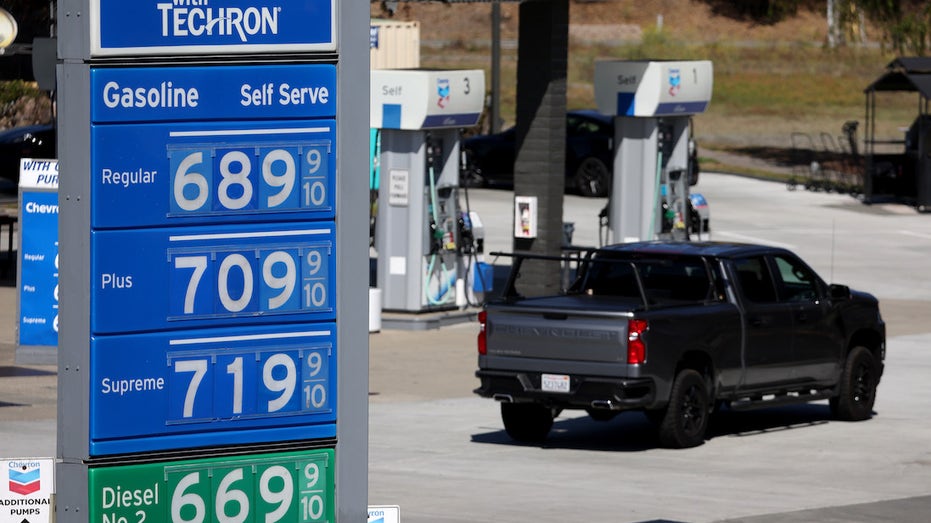Gas prices will surge in coming weeks after OPEC cuts production, analysts say
'$4 a gallon is probably a given,' analyst tells FOX Business
OPEC's oil cut surprise a 'slap in the face' to Biden: Phil Flynn
Payne Capital Management President Ryan Payne, Geltrude & Company founder Dan Geltrude, and The Price Futures Group senior market analyst Phil Flynn react to OPEC announcing oil output cuts on 'The Claman Countdown.'
Gasoline prices are likely to increase ahead of peak driving season as a result of the announcement Monday that several oil-rich nations will cut oil production, multiple analysts told FOX Business.
On Monday, the Organization of the Petroleum Exporting Countries (OPEC) announced massive oil production cuts in a potential blow to global energy markets. As part of the announcement, OPEC members, led by Saudi Arabia and joined by Iraq, the United Arab Emirates, Kuwait and other Middle Eastern countries, will reduce oil drilling by about 1.16 million barrels per day.
"People that didn't think we're going to hit $4, better think that again — $4 a gallon is probably a given," Phil Flynn, a senior market analyst with Price Futures Group, told FOX Business in an interview. "Whether we get to $5 is going to depend on a lot of things."
"But the timing couldn't be worse because this is when refiners have to start kicking into high gear to produce summer blends of gasoline," he continued. "They're going to have a harder time with less supply of oil on the market. It's going to make it more expensive to bring those barrels to the gas station, turn it into gasoline."
BIDEN DOUBLES DOWN ON GREEN ENERGY AS OPEC CUTS PRODUCTION, PRICES SOAR

American Petroleum Institute says "solution to meeting demand for affordable, reliable energy is right here in the United States." (Justin Sullivan/Getty Images / Getty Images)
Flynn added that usually when petroleum refiners transition to summer blends — which are formulated to limit certain emissions that increase in warm weather the price of gasoline and required under federal law to replace winter blends on May 1 for refiners and June 1 for retailers — gas prices increase by about 10 to 15 cents a gallon nationwide. The OPEC production cut will add upwards pressure to that normal fluctuation, he said.
According to Flynn, it is possible the average price of gasoline hits $5 a gallon during peak-driving months in the summer. Gas prices surpassed $5 per gallon in June 2022 for the first time in U.S. history, marking an all-time high.
"It alters the calculus," Tom Kloza, the global head of energy analysis at research firm Oil Price Information Service, told FOX Business. "The calculus was probably indicating very sloppy prices between $65 and $75 for crude. And now it looks as though that calculus is going to lead to somewhere in the eighties and maybe a trip above $90 in the second half of 2023."
"It's interesting — so far today, most of the reaction has been on the crude oil side, the benchmarks, moving up," he continued. "Every dollar increase in the price of crude means a production cost of about 2.4 cents per gallon for gasoline or diesel."
Kloza said he ultimately expected gas prices to rise to at least $3.60 a gallon in the coming weeks. The average price of gas in the U.S. hit $3.51 a gallon on Monday, up 3.4% compared to a month ago.

The Organization of the Petroleum Exporting Countries headquarters in Vienna is pictured on Monday. (AP Photo/Lisa Leutner, File / AP Newsroom)
"I do think that we march higher to somewhere between $3.60 and $3.75, and then it's a question of whether prices hold on there and then what happens in July and August during hurricane season," he added.
Meanwhile, the fossil fuel industry said the U.S. should boost domestic production to reduce reliance on foreign producers.
GET FOX BUSINESS ON THE GO BY CLICKING HERE
"The solution to meeting demand for affordable, reliable energy is right here in the United States," Frank Macchiarola, API's senior vice president of policy, economics and regulatory affairs, told FOX Business in a statement. "We urge policymakers to adopt sound public policy, including meaningful action on permitting reform and a robust five-year offshore oil and gas leasing program, that enables U.S. produced energy to benefit all Americans."
The Biden administration has delayed the release of a federal offshore oil and gas drilling plan, which is congressionally mandated to be released every five years, with a schedule of fossil fuel lease sales through 2028. While the previous plan expired in July 2022, Interior Secretary Deb Haaland recently said a replacement would be released in September 2023 at the earliest, more than a year late.





















